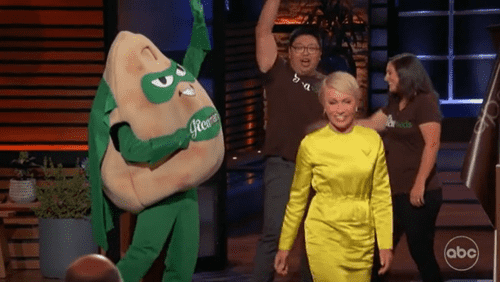'Shark Tank' Season 14: JicaFoods' owners spark ugly bidding war between Barbara Corcoran and Kevin O'Leary

LOS ANGELES, CALIFORNIA: Season 14, Episode 10 of ABC's 'Shark Tank' featured entrepreneurs Xin and Melissa Wang, who pitched their brand JicaFoods in the hopes of receiving a life-changing investment from the Sharks. Following a bidding war between Sharks Kevin O'Leary and Barbara Corcoran, the couple chose the investor who requested a lower percentage by a really thin margin.
Jicama, also known as the Mexican Turnip, is a root vegetable that tastes like a cross between an apple and a potato and has various health advantages. Despite Jicama being available in Mexico, the Wangs were disappointed to see how underestimated it was in the US market. JicaFoods tries to address this issue by selling popular snacking items made from Jicama. Such a delectable product attracted the Sharks' curiosity, and they started to track the company's progress!
RELATED ARTICLES
ChessUp bags $300K deal with Lori Greiner, 'Shark Tank' fans say no to $399 chess board
'Shark Tank': Sliimey Honey's teen founder sparks bidding war between Kevin O'Leary and Daymond John
On Friday, Xin and Melissa Wang made an enticing proposal to the Sharks, asking for $300,000 for a 3% investment. They brought jicama tacos, pico de gallo, and jicama sticks for the judges to try. "Guest Shark" Gwyneth Paltrow mentioned that she had a jicama taco dish in her most recent cookbook. Barbara swiftly got down to business, inquiring about the couple's product's pricing and sales data. Melissa stated that they manufacture their items for $1.85, set the retail price at $2.99, and sell them online for $4.99. She noted that each box has 15 wraps, with each wrap costing roughly 30 cents. She also mentioned how customers currently spend 28 cents for conventional wraps and grain-free tortillas may cost more than $1, so they believe their product is reasonably priced. Gwyneth discussed the shift in people's desire to eat grain-free foods and why these products may gain momentum now.
When Barbara inquired about profits, Xin stated that they founded the firm in 2015 and have since introduced a variety of products. The jicama chips made $500,000 in sales, but competing with the huge corporations in the healthy snack sector became difficult, and they were losing a lot of money. He went on to say that at one time, they had just $300,000 in their bank account and $70,000 in credit card debt, and they had to put their own property on Airbnb simply to make ends meet. They sold everything, even their car. In 2019, they switched from jicama chips to fresh-cut jicama. So, in 2019, their sales were $1 million, which increased to $4 million in 2020, $5 million in 2021, and $6 million in 2022. However, their profits in 2022 are expected to be lower than in previous years, with a profit of $400,000. The reason for this is that they are investing much in resources and developing their self-manufacturing capabilities. Jicama products are processed and obtained in Mexico, since it is the only country in the world that commercially farms the vegetable. The product has a shelf life of 19 days, which is 2–3 times that of ordinary tortillas. Xin also stated that they are already working with retailers such as Whole Foods and Sprouts, and that they are attempting to reach out to all major distributors in the country. They're presently in 700 doors, prompting Shark Mark Cuban to call the $6 million sales figure into doubt.
Kevin was not pleased with the couple's valuation of their firm. He mentioned how asking for $300,000 in exchange for 3% increased their company's worth to around $10 million. However, because they said that they will only make $400,000 in 2022, they are asking for a 25 multiple. He goes on to say that the stock market in the whole SOP is presently worth trillions of dollars. He didn't think anyone would pay 25x for their firm because its market valuation is 17.5. Furthermore, he said that because the couple was generating a low margin in the food industry, no one would agree to the 3% deal. The couple was ready to hear some counteroffers.
Barbara offered $300,000 in exchange for a 10% ownership and pro rata profit sharing. Mark chose to opt out of the deal for personal reasons, claiming his dislike of jicamas. Gwyneth followed Mark out and said she believed in making the products from jicama herself. Shark Lori Greiner thought the company was not for her and decided to walk away as well. Given that Barbara had only made one offer, the couple chose to counter it by asking if she was willing to do $300,000 for 5%, which Barbara immediately denied. Kevin entered the bidding war, indicating he would do the deal for 9% simply to spite Barbara. The couple countered once again with 7%.
Barbara questioned the pair, aside from finance, what they were looking for in a Shark partner. Xin replied that, as previously stated, they have factories in place and only want assistance with sales and marketing. Kevin told them that he could assist them. He said that because he already has so many items in the category, he could open the doors for them, but Barbara retorted that she knows what she does well, which is sales and marketing. Melissa asked the Sharks if any of them were willing to finalize the sale at a 6% stake with 2% advisory shares and pro rata payout after a few jabs back and forth. Barbara indicated she would take the proposal if the advisory share was upped by 1% simply to beat Kevin to it. And with that, the deal was completed!

'Shark Tank' Season 14 airs every Friday at 8/7c on ABC. Missed an episode? Been wanting to catch up? Episodes can also be viewed the next day on demand and on Hulu. Not just that, you can also watch old seasons and episodes on Amazon Prime Video and iTunes.










